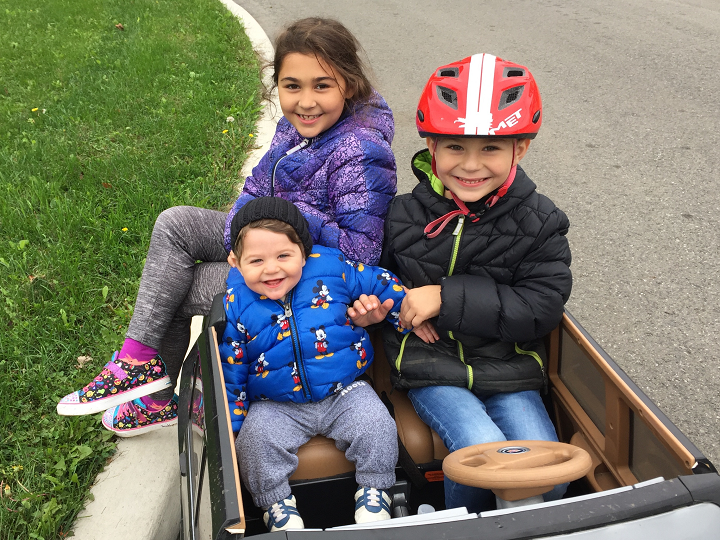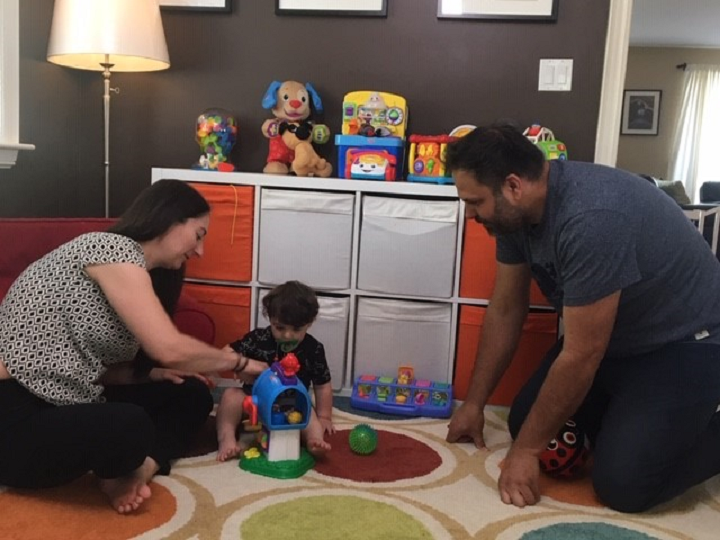Terry Pirovolakis, his wife and his youngest child, Michael, sit in a colourful play area at the corner of their East York home.

Pirovolakis is coaxing Michael to throw him a small flashing ball.
Each time he does, mother and father clap and cheer him on. The family finds joy in small victories these days.
“He looks like a normal kid … loves life. He’s an angel. He’s my little buddy,” said Pirovolakis, eyes brimming with tears.
The last few months have been painful for the family of five.
Michael has an older sister, eight-year-old Zoe, and a big brother Zack, who is five.
Zoe and Zack are healthy. Michael, however, is fighting for his life against an ultra-rare neurodegenerative disease.
“Around six months in, we noticed he (Michael) wasn’t really reaching up so we went to see the doctor. The doctor sent us to the pediatrician and she realized he had something called low muscle tone,” recalled Pirovolakis about his son.
Physiotherapy seemed to help. There were also numerous doctor appointments, MRIs, blood work and other tests.
“It could be this, it could be that, it could be nothing,” recalled Michael’s mother, Georgia Kumaritakis. “He could outgrow it, and as a parent, you’re hopeful, but at the same time you know.”
WATCH: Ontario family fights to find cure for son with rare illness

The final piece of the puzzle was whole genome sequencing, which maps out a person’s DNA. It is used to test for genetic disorders. And that is exactly what it found in Michael.
“They told us Michael had this ultra-rare condition and he was the only child in Canada and honestly our world fell apart,” cried Kumaritakis
Michael has hereditary spastic paraplegia type 50, otherwise known as SPG50.
Children afflicted with this genetic disorder present with a variety of symptoms, including global developmental delay, microcephaly, seizures, malformation of the brain, and hypotonia.
- Invasive strep: ‘Don’t wait’ to seek care, N.S. woman warns on long road to recovery
- Canadian man dies during Texas Ironman event. His widow wants answers as to why
- ‘Super lice’ are becoming more resistant to chemical shampoos. What to use instead
- Solar eclipse eye damage: More than 160 cases reported in Ontario, Quebec
The outlook is not promising.
The disorder results in loss of mobility of all extremities and degradation of brain function resulting in severe intellectual disability.
The diagnosis was devastating for the Toronto parents, who had big dreams of a bright future for their youngest child.
“Everything you have hoped for your child was just gone,” Kumaritakis explained through tears. “There was no hope… you think about what may not be, you think about the future that may not happen.”
The diagnosis came less than three months ago, yet the couple has already begun researching a cure for Michael.
Researchers believe gene therapy has the potential to halt the progression of SPG50 and even reverse some of the damage.
It is an experimental technique that uses genes to treat or prevent disease and has successfully been applied in recent cases around the world.
“It is replacing the gene that is mutated,” said Dr. Darius Ebrahimi-Fakhari, pediatric neurologist and neuroscientist at Boston Children’s Hospital. “I think a cure is possible and I think it’s possible because there’s some very new and very exciting technologies like gene therapy.”
Ebrahimi-Fakhari explained the reason SPG50 is rare is that as recent as five years ago, the tools to make the diagnosis were not available but he believes there will be more cases.
“We’re starting to see it because we are sending the genetic testing for it and I think it’s a vastly under-diagnosed condition so I think we’ll see a lot more cases in the future,” he noted.
“This little boy that is going to fall apart in front of you, how do you accept that? We are not going to accept that,” said Terry.
After the initial shock and sadness set in, the couple turned grief into fuel, to begin the fight for answers for their son.
“We researched 30,000 articles and called hundreds of doctors and flew to Washington, the UK, met with the doctors in Texas and we decided of all the therapies that were potentials, the one that made the most sense was gene therapy,” said Pirovolakis.
The family has also been in contact with others in the United States and overseas who have children with similar diseases.
Together, via social media, they share experiences, fears, and hope that one day a cure will be found for their children.
There are not many of them, however. Fewer than 60 children worldwide are believed to have the disease.
“We have no one,” said Pirovolakis. “Michael is the only kid in Canada that has this rare disease.”
Because of the rarity of SPG50, little research has been conducted.
The couple is hoping to fund a cure with the help of others’ generosity, having launched a GoFundMe campaign and website.
The goal is to raise $3 million.
As the family explains, $1 million will be given to researchers to build a treatment and provide details for clinical trials, an additional $1 million is needed to create the drug that will be used to treat children during the clinical trials, and the third $1 million is necessary to work with the U.S. Food and Drug Administration to complete the clinical trials for formal approval.
“It’s not just to cure one kid, we’re curing hopefully the whole disease,” said Pirovolakis.
Ebrahimi-Fakhari said the key to finding the cure through gene therapy, lies with families like Michael’s.
“It’s these families that are driving research. This is an ultra-rare condition that we don’t know much about without them going out raising money for research we would not be able to do this work,” he said.
Time is also of the essence — Michael is 18 months old and in less than two years, spasticity and neurological delays will begin to affect him.
WATCH: (June 24, 2019) Doctors from all over North America help Calgary girl fight for her life

That fact is not lost on the couple.
“I stopped praying for a while,” cried Pirovolakis. “Why would they do this to him? why would he have this disease?”
Upstairs, in a cheerful corner bedroom, dad reads to his young son on a rocking chair, the sun beaming in from a window behind them.
Michael lifts the flaps on the book as his father instructs, and snuggles into his arms.
These moments are precious for Terry Pirovolakis, who is racing against the clock to ensure they will not run out.

%20STILL.jpg?w=1040&quality=70&strip=all)




Comments